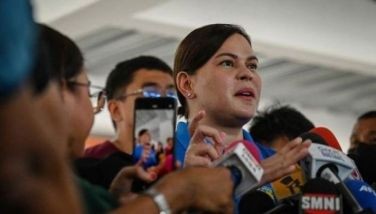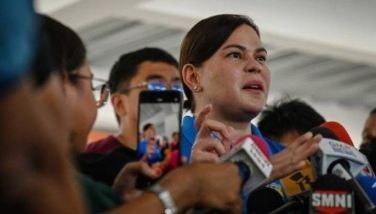RP working to extradite wife of tax scam suspect in Canada
July 21, 2005 | 12:00am
The government has started coordinating with Canadian authorities for the immediate extradition of the wife of the main suspect in a multibillion-peso tax credit scam.
Chief Special Prosecutor Dennis Villa Ignacio made representations with Canada seeking the assistance of Ambassador Peter Henry Sutherland to locate Gloria Chingkoe, wife of tax scam prime suspect Faustino Chingkoe, who reportedly transferred his family’s assets to Vancouver.
The Office of the Special Prosecutor (OSP) said the Chingkoe couple are holders of "Filipino-Canadian citizenships," and that according to "intelligence reports," the wife had since been residing in Vancouver which is why the arrest warrant could not be served.
"We would like to ask for your assistance to confirm if Ms. Chingkoe is, in fact and in truth, in Vancouver. This information would be vital in the prosecution of the extradition proceedings against Ms. Chingkoe," Villa Ignacio said in his two-page letter.
The OSP, prosecuting arm of the Ombudsman, also revealed to Sutherland that it had received reliable "information that a portion of the proceeds of the tax scam was remitted by the spouses to Canada and were used in certain businesses and in buying properties."
"This information would be crucial in assessing the possibility of instituting legal actions for the forfeiture of their properties worldwide," Villa Ignacio disclosed, saying there are four properties the Chingkoes bought in Richmond.
Among the properties they were suspected to have acquired with funds derived from the government is a house on Tolmie Street in Richmond reportedly worth 500,000 Canadian dollars.
"Mrs. Chingkoe is a very significant connection in the laundering and transferring of all these assets to Canada. Chingkoe is a vital component in the transfer of the family’s assets," Villa Ignacio said earlier.
The prosecutor said they also intended to "tap" bilateral agreements signed between the two governments, like the Mutual Legal Assistance Treaty, in a move to freeze potentially criminal assets through the help of the international anti-money laundering council.
Villa Ignacio said they had received information and had reason to believe the Chingkoe couple planned to leave the country and settle in Canada for good. He cited the March-April (2005) issue of the Asian Pacific Post, which reported the assets transfer.
"Chingkoe and his wife had fled to Richmond where they spent hundreds of thousands of dollars buying up real estate. The spouses were residing at Tolmie Street in Richmond in a house worth 500,000 Canadian dollars," he said, quoting the newspaper.
The newspaper likewise added: "The Chingkoe couple had also invested in several other properties on Westminster highway and an Alderbridgeway in Richmond, according to property records."
The Chingkoes are facing graft charges in connection with the tax scam in which 11 of their firms were allegedly involved. The government estimates that P3 billion of the total P5.3 billion tax scam involved the Chingkoe companies.
Prosecutors said the Chingkoes connived with finance officials in acquiring spurious tax credit certificates although they were not entitled to such tax refunds, causing undue injury to the government.
Chief Special Prosecutor Dennis Villa Ignacio made representations with Canada seeking the assistance of Ambassador Peter Henry Sutherland to locate Gloria Chingkoe, wife of tax scam prime suspect Faustino Chingkoe, who reportedly transferred his family’s assets to Vancouver.
The Office of the Special Prosecutor (OSP) said the Chingkoe couple are holders of "Filipino-Canadian citizenships," and that according to "intelligence reports," the wife had since been residing in Vancouver which is why the arrest warrant could not be served.
"We would like to ask for your assistance to confirm if Ms. Chingkoe is, in fact and in truth, in Vancouver. This information would be vital in the prosecution of the extradition proceedings against Ms. Chingkoe," Villa Ignacio said in his two-page letter.
The OSP, prosecuting arm of the Ombudsman, also revealed to Sutherland that it had received reliable "information that a portion of the proceeds of the tax scam was remitted by the spouses to Canada and were used in certain businesses and in buying properties."
"This information would be crucial in assessing the possibility of instituting legal actions for the forfeiture of their properties worldwide," Villa Ignacio disclosed, saying there are four properties the Chingkoes bought in Richmond.
Among the properties they were suspected to have acquired with funds derived from the government is a house on Tolmie Street in Richmond reportedly worth 500,000 Canadian dollars.
"Mrs. Chingkoe is a very significant connection in the laundering and transferring of all these assets to Canada. Chingkoe is a vital component in the transfer of the family’s assets," Villa Ignacio said earlier.
The prosecutor said they also intended to "tap" bilateral agreements signed between the two governments, like the Mutual Legal Assistance Treaty, in a move to freeze potentially criminal assets through the help of the international anti-money laundering council.
Villa Ignacio said they had received information and had reason to believe the Chingkoe couple planned to leave the country and settle in Canada for good. He cited the March-April (2005) issue of the Asian Pacific Post, which reported the assets transfer.
"Chingkoe and his wife had fled to Richmond where they spent hundreds of thousands of dollars buying up real estate. The spouses were residing at Tolmie Street in Richmond in a house worth 500,000 Canadian dollars," he said, quoting the newspaper.
The newspaper likewise added: "The Chingkoe couple had also invested in several other properties on Westminster highway and an Alderbridgeway in Richmond, according to property records."
The Chingkoes are facing graft charges in connection with the tax scam in which 11 of their firms were allegedly involved. The government estimates that P3 billion of the total P5.3 billion tax scam involved the Chingkoe companies.
Prosecutors said the Chingkoes connived with finance officials in acquiring spurious tax credit certificates although they were not entitled to such tax refunds, causing undue injury to the government.
BrandSpace Articles
<
>
- Latest
- Trending
Trending
Latest
Trending
Latest
Recommended






























